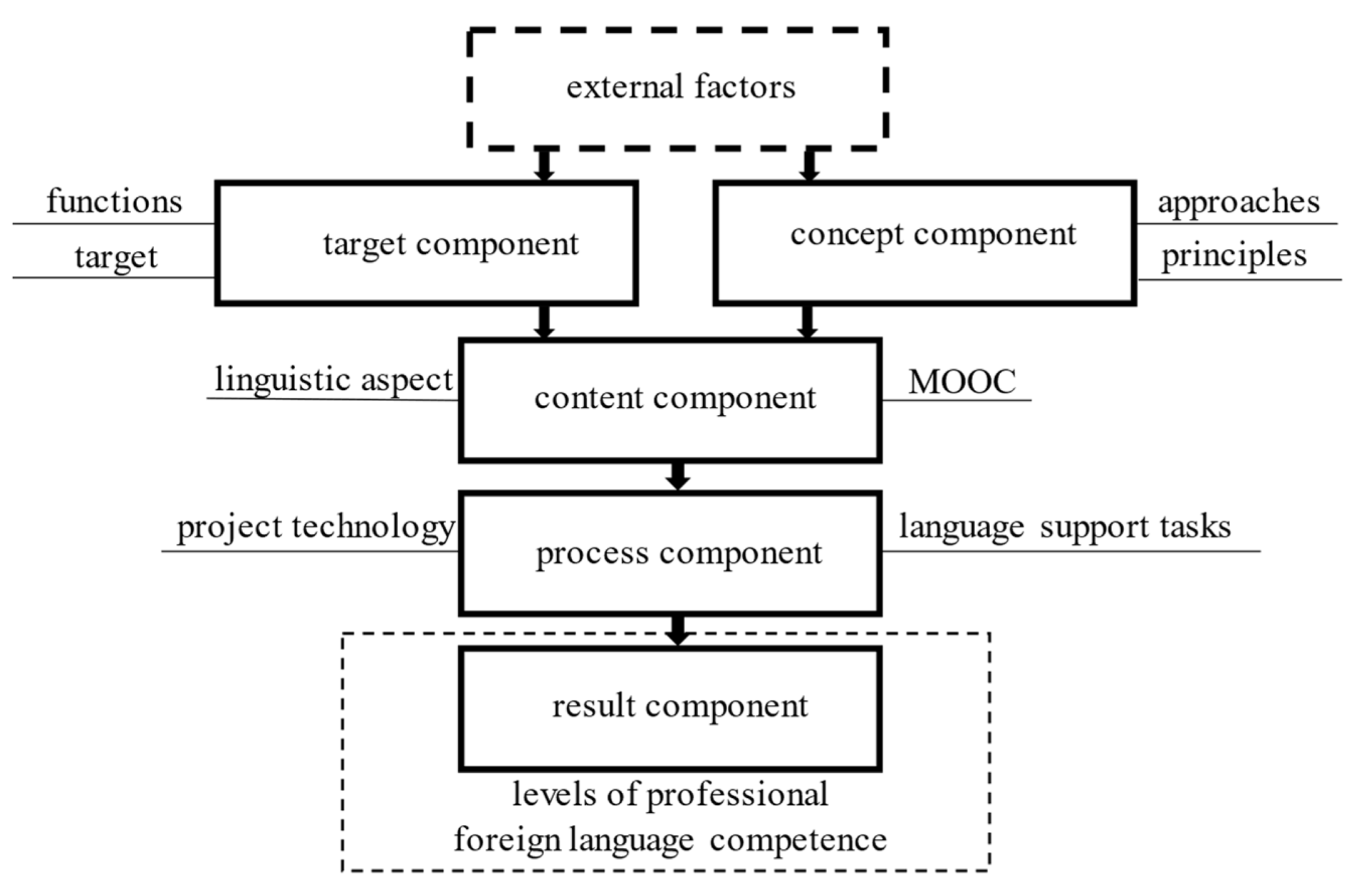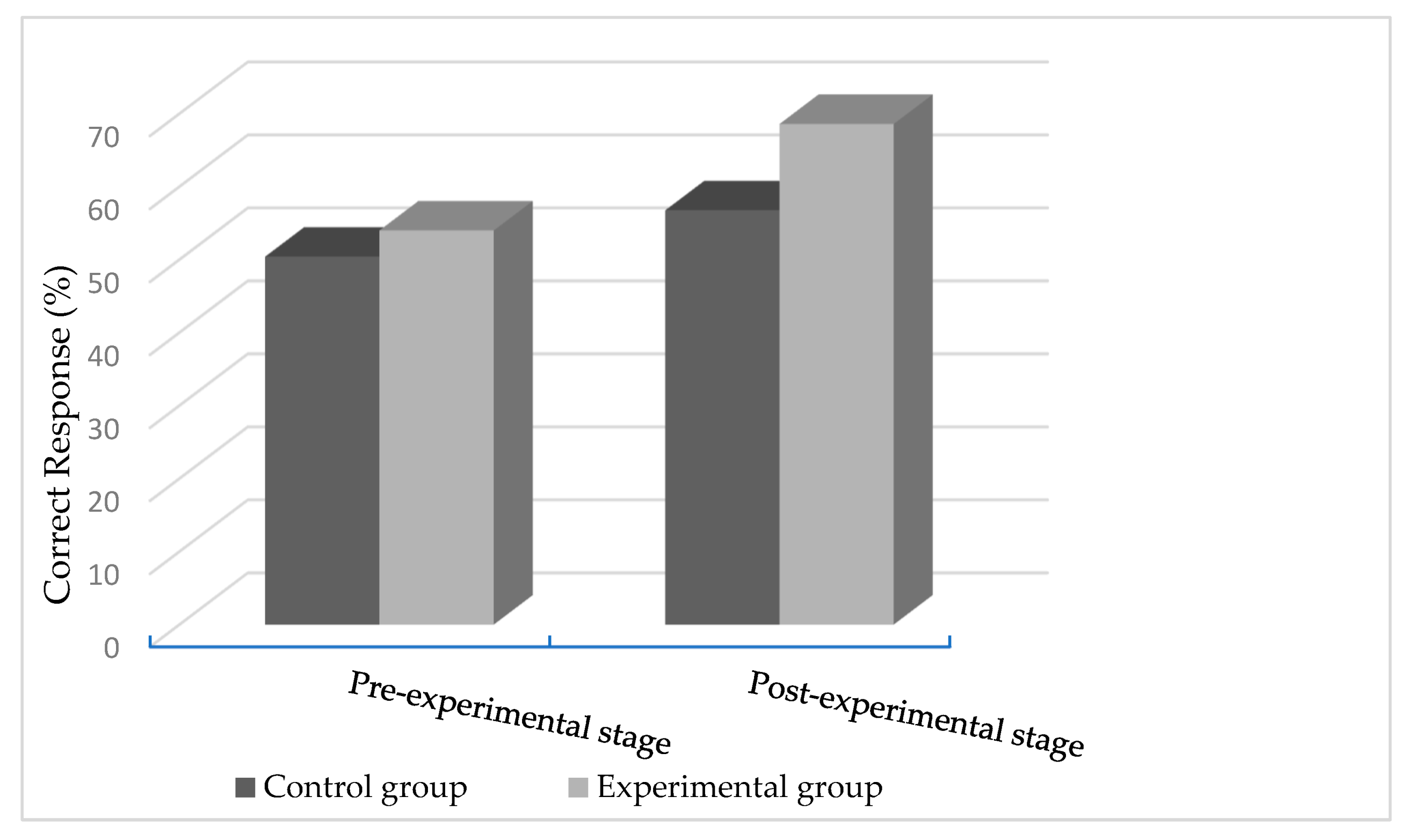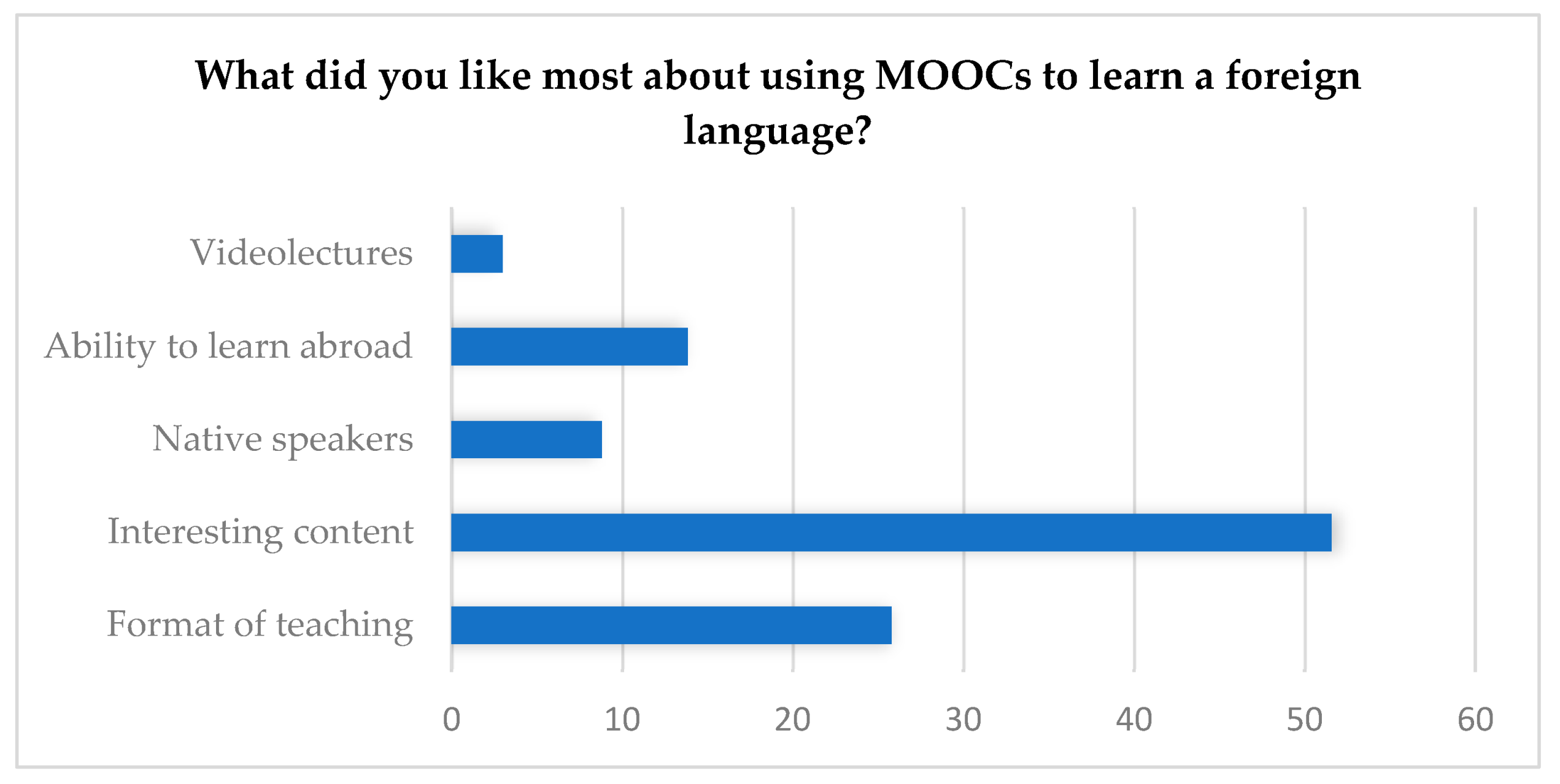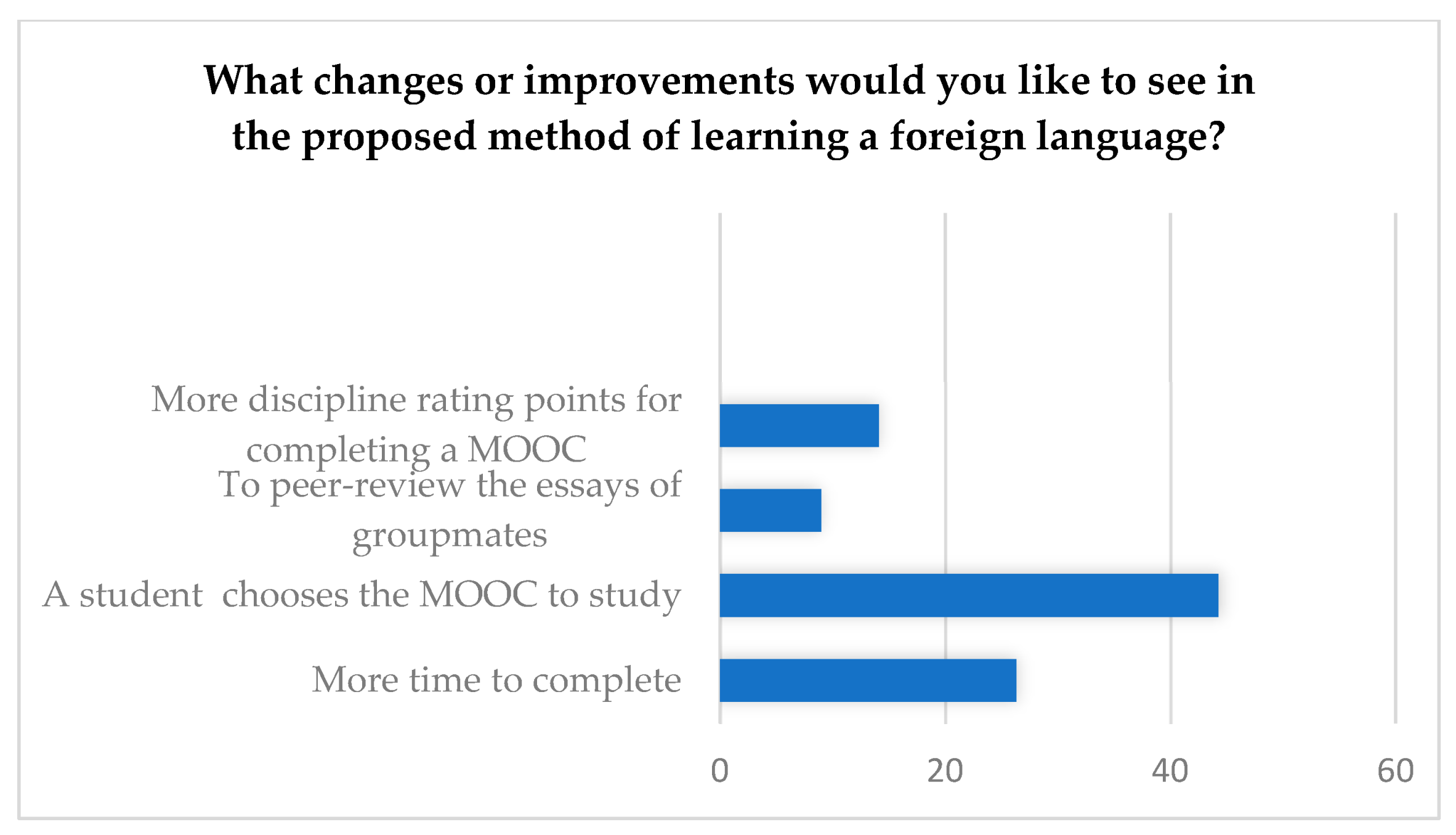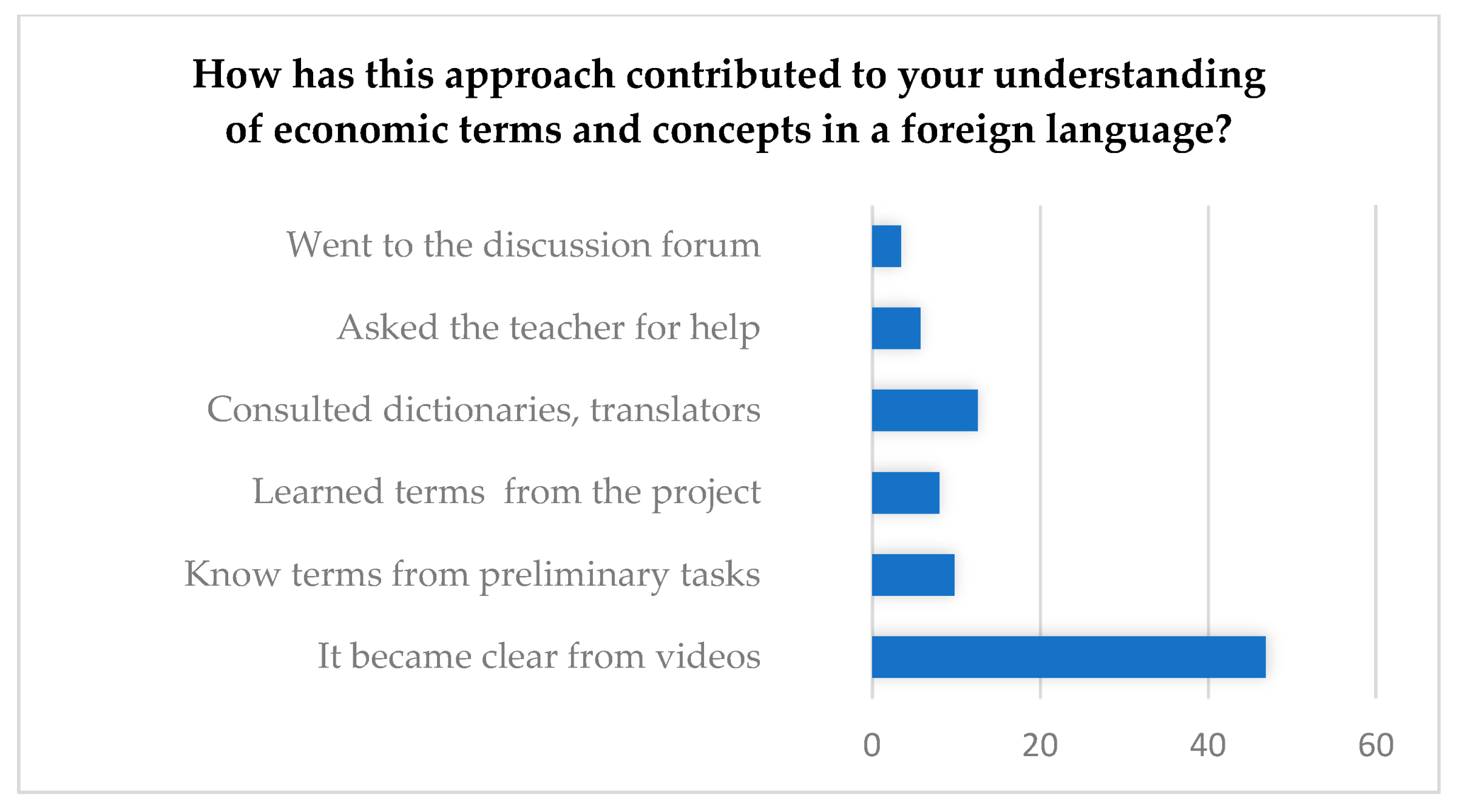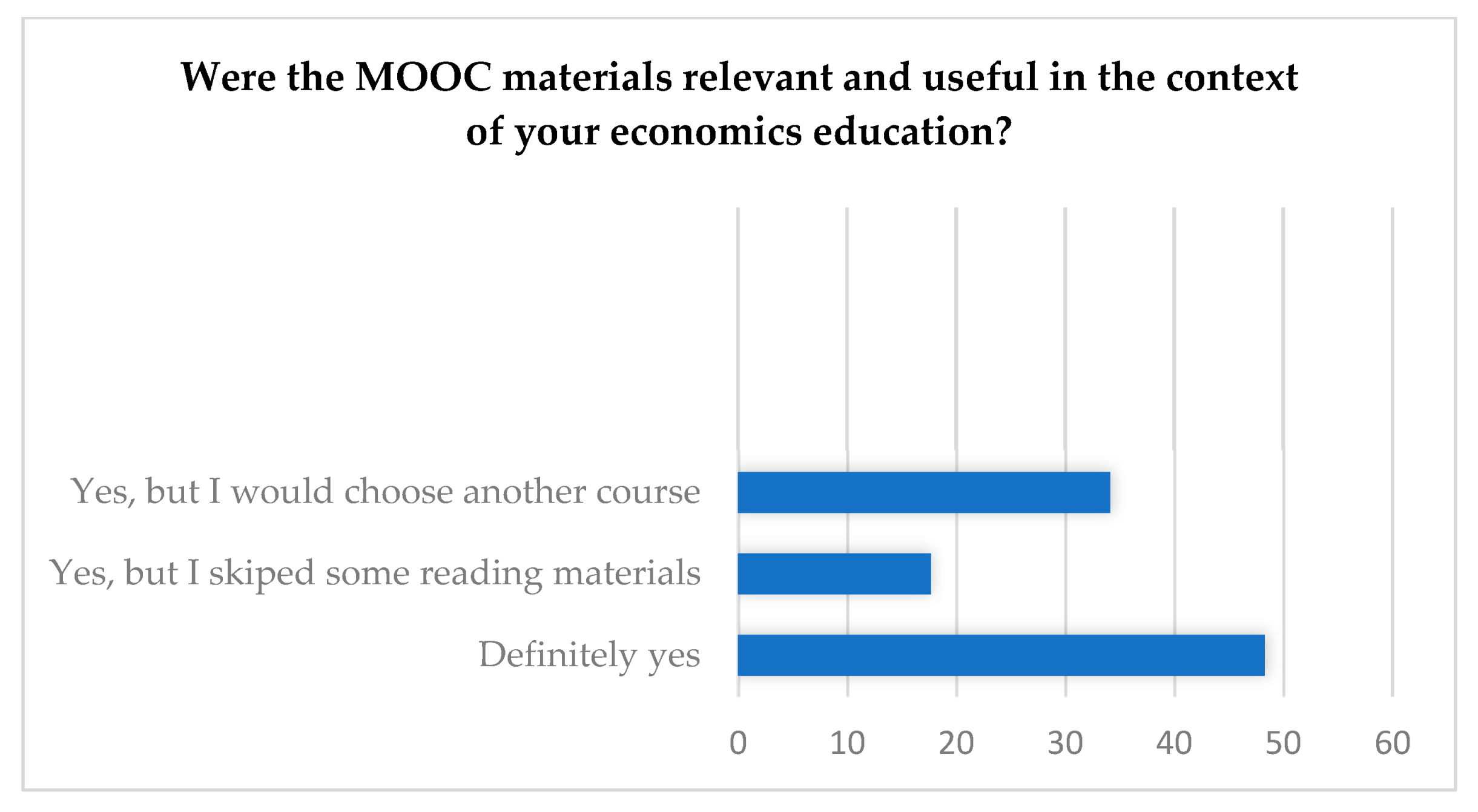1. Introduction
The global corona crisis has instigated profound disturbances within the educational sphere, propelling a swift shift toward virtual learning tools and platforms [
1,
2]. This abrupt transition to distance learning has posed a unique blend of obstacles and prospects for global institutions and educators. One facet that has undergone remarkable evolution is the honing of professional aptitude amongst pupils across diverse fields. This manuscript homes in on the progress of professional foreign language competence in economics students, set against the backdrop of this widespread health emergency. Foreign language proficiency is a crucial skill for economics students, as it enhances their ability to engage in global economic activities and communicate effectively in an increasingly interconnected world. In response to the pandemic-induced restrictions on traditional face-to-face instruction, massive open online courses (MOOCs) have emerged as a viable alternative for language learning [
3]. Previous studies have examined the impact of digitalization on the educational environment, highlighting the importance of digital competence and its influence on students’ competitiveness [
4,
5]. The role of self-regulation in e-learning has also been explored, emphasizing the need for students to set goals and employ effective strategies in online learning environments [
6]. Additionally, research has investigated the challenges faced by educators during the transition to online education, including issues related to technical communication, lack of live interaction, and increased workload. Researchers aspire to discern how these challenges impact the teaching process and how educators adapt to new technologies. They are interested in understanding the effects on student learning and engagement, as well as how the transition to online education influences the workload of teachers [
7,
8,
9].
2. Literature Review
Tertiary English teaching plays a crucial role in equipping students with essential language skills for academic and professional success. Over the years, various studies have explored the integration of MOOCs and innovative teaching approaches to enhance the effectiveness of English instruction. This section aims to synthesize the key findings from the most relevant studies, highlighting the benefits of MOOCs and innovative approaches in promoting active learning behavior, addressing language barriers, encouraging learner interaction, improving language skills, fostering autonomous learning, and leveraging big data technology.
One study [
10] emphasized the importance of active learning behavior and student-centered approaches in the context of MOOC-based English network teaching systems. It highlighted the integration of online learning, interactive communication, curriculum publishing, and news bulletins as effective ways to promote active learning and enhance teaching effectiveness. Language barriers can hinder non-native English-speaking students’ participation in MOOCs [
11]. This finding suggests the need for face-to-face interaction and structured guidance from instructors. The flipped classroom approach, which combines video content viewing at home and in-class social interaction, was proposed as an effective strategy to address these challenges. Furthermore, another study [
12] revealed the importance of promoting learner interaction in English MOOCs. Learners tended to rely heavily on instructional videos and saw instructors as authorities responsible for knowledge transmission. Therefore, creative approaches should be employed to enhance learner interaction and engagement. The integration of MOOCs and flipped teaching has shown promising results in improving language skills [
13]. Iranian intermediate EFL learners demonstrated improved reading comprehension and grammar skills through various activities such as communication, film viewing, and group discussions. Collaborative learning facilitated by online courses and flipped teaching was found to enhance learners’ success. MOOCs based on deep learning have proven effective in college students’ English grammar teaching [
14]. By utilizing multimedia resources and promoting active knowledge construction, deep learning enhances students’ autonomous learning, online communication, and collaboration. The integration of online and offline teaching modes, along with teacher guidance, promotes effective learning outcomes, including improved mastery of basic knowledge, practical skills, and teamwork abilities. The optimization of a Bayesian knowledge-tracking model in college-level English teaching demonstrated high accuracy in predicting students’ learning status and answer performance [
15]. By incorporating students’ learning behavior and forgetting behavior, the model provided valuable insights into individual mastery of different knowledge points, contributing to a more personalized and targeted approach to instruction. An improved model for recommending topic posts in MOOC forums showed positive outcomes in enhancing student participation and teaching performance in college-level English cross-cultural education [
16]. This model effectively attracted students’ interest and encouraged active engagement with the content, fostering a more vibrant and interactive learning environment. The MOOC+SPOC teaching mode in higher vocational English education promoted student-centered learning, learning autonomy, appropriate task quantity, knowledge internalization, and improvement in English writing level [
17]. This approach empowered students to take ownership of their learning and actively engage with MOOC videos. Moreover, students reported positive results in terms of knowledge internalization and improvement in their English writing abilities. Integrating big data technology into college-level English teaching holds immense potential for enhancing monitoring accuracy, timeliness, and early warning capabilities [
18,
19]. By leveraging online learning platforms and data analytics, personalized and student-centered teaching can be achieved, leading to improved student participation and overall teaching quality.
The findings from the corpora of studies shed light on the benefits of incorporating MOOCs and innovative teaching approaches in college-level English instruction. These approaches enhance active learning behavior, address language barriers, promote learner interaction, improve language skills, foster autonomous learning, and leverage big data technology. By adopting these strategies, educators can create a dynamic and engaging learning environment that caters to diverse student needs, ultimately enhancing the effectiveness of college-level English teaching. Continued research and refinement of these approaches are crucial for further advancements in the field of English language education. However, despite the significant potential of MOOCs in teaching foreign languages [
20,
21], more research is needed to optimize their integration design and implementation in the context of universities. The consideration of MOOCs as part of a strategy of blended learning in distance mode during a pandemic in order to develop the professional foreign language competence of economics students seems to be a promising direction for further research.
3. Materials and Methods
For the purposes of this study, we employed various research methodologies. A theoretical analysis of the literature was utilized to determine the current state of the issue and to identify primary trends and approaches to MOOC-based education amidst the pandemic conditions. A qualitative analysis of student responses from a survey was conducted to gain an in-depth understanding of their opinions, experiences, and attitudes towards an MOOC-integrated approach to learning. A quantitative analysis of the results from control measurements was performed to statistically evaluate changes in students’ professional foreign language competence. A comparative analysis between control and experimental group outcomes was used to assess the efficacy of implementing the online language support course. Lastly, methodological modeling was adopted to design the educational environment and orchestrate conditions for the instructional experiment.
Due to the COVID-19 pandemic that began in 2020, the educational process at many universities in Russia and the world has undergone significant changes [
22]. Lectures and seminars at universities were held remotely and in mixed mode. At the Novosibirsk State University of Economics and Management, it was decided to conduct foreign language classes remotely. A total of 34 students of the Faculty of Public Sector specializing in international business took part in the learning experiment. According to the curriculum adapted in connection with the pandemic in the discipline “Professional Foreign Language”, in addition to the main textbook “Guide to Economics” (L. Raitskaya, S. Cochrane—Macmillan), both the control and experimental groups studied MOOC materials. Classes were held on the Microsoft Zoom platform 6 h a week. The students of both groups studied the open online course in an independent mode, and the discussion of the content of the MOOC and the presentation of projects at the end of the course took place in the format of a videoconference. The MOOC of choice, “Business English: Finance and Economics”, developed by Arizona State University and hosted on the Coursera platform, lasts 6 weeks, is taught in English and covers topics such as budgeting, forecasting, purchasing, auditing and economics. The key difference was that the students of the experimental group, before starting the MOOC, completed the tasks of the online language support course, previously developed for this MOOC. The online language support course is hosted in the electronic educational environment Moodle of the Novosibirsk State University of Economics and Management and contains language and speech tasks for working with the basic vocabulary and grammar found in the MOOC studied. The advantages and limitations of this approach were identified through a survey of 34 students.
During the initial phase of our research, we crafted a digital language support course designed to enhance professional foreign language skills through MOOCs within the university’s online learning platform. In this context, “language support” refers to a comprehensive collection of preparatory resources utilized by both educators and students. These resources adapt the instructional procedure tailored for specific MOOCs, alongside methods and strategies for content and language amalgamation, focusing on students’ grasp of the course content in a foreign language. The ultimate goal is to reduce dependency on their mother tongue and translation tools during lessons. This digital course comprises a lexicon of fundamental terms and a sequence of linguistic drills, progressively arranged from basic to intricate levels: starting with word-based tasks, moving on to phrase-related exercises, followed by sentence-based challenges, and culminating in text-related assignments. Refer to
Table 1 for illustrative examples.
Sample Criteria:
Proficiency in a Foreign Language: This ensured that the participating students were approximately at the same level of foreign language proficiency.
Experience with MOOCs: Selecting students with little or no experience with MOOCs was a significant criterion to account for different backgrounds and prior knowledge.
Major or Specialization: Given that the course was tailored to a professional subject in a foreign language, the sample considered students with a major in economics and a focus on international business.
Technological Literacy: The participants had the essential technical skills required to access and utilize the online course.
Sample Stages:
Determining Sample Size: The sample size was restricted by the number of first-year students at NSUEM enrolled in the specified major and specialization.
Participant Selection: All the participants had the entry-level English proficiency of intermediate. Some students were only familiar with the concept of such online platforms, all were majoring in international business, and all had basic computer and online tool competency.
Group Formation: Participants were divided into control and experimental groups.
Conducting an Orientation Session: An orientation session was held for participants before the research commenced, clarifying the research objectives, expectations, and process.
4. Results
4.1. Methodical Model Development
To conduct a learning experiment on the development of professional foreign language competence using massive open online courses during the pandemic, we developed a methodical model that includes target, concept, content, process and result components. By external factors, we mean the social order for the training of a highly qualified specialist, the requirements of the federal state educational standard, as well as the requirements of the professional standard. The target component contains a goal itself—the development of professional foreign language competence of economics students using MOOC learning materials remotely during a pandemic. The target component determines the functions of the model—goal-setting, teaching, educating, the function of the organizer of business negotiations, organizational, gnostic, planning and controlling. The concept component is formed by the approaches and principles of learning. Among the approaches, one can single out a competence-based, communicative, professionally oriented and content- and language-integrated learning approach. Among the principles, one can note the transition from studying a specific profession to the development of basic, key and special competencies. Life-long learning: the transition from subject to interdisciplinary education, the development of the ability to solve problems independently, orientation to the personality of the student, a level approach to assessing results. Learning to communicate through the organization of communication, situationality, authenticity, reliance on the native language. The gradual introduction to the essence of the major, the systematic presentation of educational material in compliance with the logic of the development of special topics from simple to complex, motivational support for educational activities, the creation of a positive emotional climate, a rational combination of collective and individual forms and methods of educational work. Joint activities of the teacher and students, a foreign language acts as a means of studying any discipline, a foreign language teacher determines the relationship between language and subject, the use of one foreign language in class, the inclusion of facial expressions, gestures, pictures, sounds of presentations for better understanding. The principle of 4Cs—content, communication, cognition and culture. The content component is the materials of the MOOC selected: short micro-lectures 4-8 min long with the ability to read subtitles, comprehension tests, reading articles, a discussion forum, final quizzes and a final project. The linguistic aspect refers to the features of economic discourse: a large amount of general economic vocabulary, cross-industry terms, phraseologized terminological turns, professional idioms, abbreviations, abbreviations used in business speech, terminological neologisms that reflect modern transformations in the field of economics and business, digital designations and formulaic indicators, transformed into verbal expressions, lexical synonymy, British English lexemes and Americanism terms, coexistence of obsolete and modern terms, graphic formations of a hybrid nature, the use of passive constructions, the widespread use of modal verbs and simple sentences with a compound predicate formed from a verb-copulas and predicatives, a homogeneous series, which includes 5–6 units, the presence of parenthetic words, economic metaphors, set expressions based on the transfer of the name, reflecting the perception of the business world in English-speaking countries, epithets, metonymy, repetitions, parallel constructions, introductory constructions, the components of which give different semantic shades to a holistic statement, inversion and allusion. The use of project technology in teaching a foreign language implies the creation of projects that include various aspects of economic education and require students to use a foreign language. As part of the studied MOOC, students are encouraged to explore and analyze the economic situation, using a foreign language as the main means of communication and research. Language support tasks are a set of language, speech and communication tasks, their preliminary completion by economics students will make the process of studying MOOC materials more efficient. The result component of the model is the developed professional foreign language competence of future economists and diagnostic tools for assessing the level of development of the studied competence according to the low, medium and high levels of development. The developed methodical model is demonstrated in
Figure 1.
To analyze the developed model for the formation of professional foreign language competence among economics students using MOOCs, we must take into account various internal and external factors that could impact the effectiveness of this approach. As for external factors, they can have a significant impact on the process and outcomes of the model’s application. These factors include:
Technological Infrastructure: The implementation of MOOCs requires stable and reliable internet access and adequate technological tools for both students and educators. Any disruptions or lack of availability could hinder the learning process.
Cultural Context: The students’ background and familiarity with online learning environments can significantly influence their comfort level and engagement with MOOCs. Some students might struggle with this new format if they are accustomed to more traditional educational approaches.
Language Proficiency: MOOCs often use English as the language of instruction. Therefore, students’ existing proficiency in the language can have a substantial impact on their ability to engage with course content effectively.
Support Systems: External support from the educational institution, such as technical support for using MOOCs or pedagogical support for optimizing the learning experience, can significantly influence the model’s effectiveness.
Pandemic and Remote Learning Conditions: With the increased reliance on online learning due to the pandemic, the ability to adapt and engage with digital learning resources such as MOOCs has become more important. However, this sudden shift can also increase stress and cognitive load on students, potentially impacting their learning outcomes.
Course Quality: Not all MOOCs are of equal quality, and the chosen MOOC’s structure, content, and teaching methods can significantly affect students’ learning experiences and outcomes.
By acknowledging these external factors and adjusting the teaching methods and learning support systems accordingly, the model for developing professional foreign language competence using MOOCs can be made more effective and adaptable to various conditions and learning contexts. It is also important to note that this model should be continuously evaluated and refined based on feedback from students and educators to ensure its ongoing relevance and effectiveness.
4.2. Statistical Validation of the Research Findings
Before and after the learning experiment, students of the control and experimental groups were offered a comprehensive communication test, in which students had to demonstrate knowledge of professional vocabulary, as well as the ability to write, speak, read and listen to speech in a foreign language. In the commencement of this learning experiment, both control and experimental groups demonstrated a comparable level of professional foreign language competence. However, upon the experiment’s conclusion, the measured competence showed divergent growth levels (the experimental group outperformed the control group by 7.42%).
To gauge the effectiveness of the evolved methodical model, the data from the control and experimental groups was analyzed using the Student’s
t-test for independent samples. This method stands out due to its ability to pinpoint statistical significance in the discrepancies between two sample groups. The outcomes from the prior testing are depicted in
Table 2. The level of statistical significance (
p-value) was
p = 0.05.
The data listed in
Table 2 indicate that there is no statistically significant difference between the comprehensive assessment results of first-year students in the experimental and control groups before the experiment (denoted as “CG before” and “EG before” in
Table 2, respectively). Thus, one can conclude that the English language proficiency among students after secondary school, is at a comparable level in both groups.
Table 3 lists the comparative data from the prior and final testing within each group (denoted as “CG after” and “EG after” in
Table 3, respectively). The gleaned results highlight an improvement in scores within both groups during the study period (for the control group
t = 2.61; for the experimental group
t = 3.47). Note that the critical
t-test value was of 2.037 at a level of statistical significance of
p = 0.05. The obtained
t-test values indicate that both pedagogical methodologies (implementing the language support tasks and learning MOOC materials without them) are effective for the development of students’ professional foreign language competence.
In a bid to ascertain the efficacy of the evolved methodical model, a comparison of the statistical data from the final testing in both the control and experimental groups was undertaken (
Table 4).
There is a statistically significant variance after the final testing outcomes between the control and experimental groups (
Table 4). Thus, one can conclude that the proposed methodical model for a stepwise enhancement of professional foreign language competence among economics students through the application of MOOCs has merit.
Figure 2 delineates the diagnosis results of the professional foreign language competence level among economics students in both the control and experimental groups, during the pre-experimental and post-experimental phases.
4.3. Outcome 3
To identify the advantages and limitations of using MOOCs to develop the professional foreign language competence of economics students during the pandemic, students in the control and experimental groups were asked to answer a pool of questions related to their personal experience of studying a massive open online course within the discipline “Professional Foreign Language” in distance learning. Economics students answered the questions anonymously, their response data were processed manually. Feedback from economics students is presented on pie charts (see
Figure 3,
Figure 4,
Figure 5,
Figure 6,
Figure 7,
Figure 8 and
Figure 9). Students were asked the following range of questions:
What did you like most about using MOOCs to learn a foreign language?
Are there any aspects of using MOOCs that were difficult or not understood?
What changes or improvements would you like to see in the proposed method of learning a foreign language?
Do you feel that MOOCs have helped you improve your language skills such as listening, speaking, reading or writing?
How have MOOCs contributed to your understanding of economic terms and concepts in a foreign language?
Were the MOOC materials relevant and useful in the context of your economics education?
Would you recommend the use of MOOCs to other students for learning a foreign language and why?
An analysis of student feedback yielded several conclusions. This learning format primarily appeals to students due to its content and inherent structure. A majority of undergraduate students encountered challenges with unfamiliar professional vocabulary and watching videos without subtitles, likely due to their lack of previous experience with such a format. As the MOOC was chosen by the instructor for blended learning, many students expressed the idea of independently selecting an MOOC. However, implementing this idea is challenging, given that the instructor had pre-designed language support tasks within the utilized pedagogical model. The majority of students were confident that completing an MOOC enhances their skills in various types of speech activities. According to students, the most valuable resource for understanding economic content are the micro-lectures in video format. All students agreed that the chosen MOOC aligns with their economic curriculum, underscoring its educational potential. Nevertheless, students also noted the necessity for preliminary English language preparation, emphasizing the invaluable role of an instructor’s adaptive, motivational and supportive interventions.
4.4. Views of Students Who Participated in the Research
The feedback received from the students served as the basis for developing recommendations for optimizing the process of developing the professional foreign language competence of economics students using MOOCs during the pandemic. When organizing the educational process of teaching and learning a foreign language at a university, the following is recommended:
To place motivating accents during the introductory workshop before the start of the MOOC. The teacher should focus on the features of the teaching format, the advantages of the video format, the opportunity to listen to the speech of native speakers, and also become acquainted with how they teach abroad.
Potential difficulties should also be removed—students with a low level of development of professional foreign language competence should be encouraged to turn on subtitles when watching video lectures, to expand students’ vocabulary on the subject of the course, pay attention to the structure of written works in the essay genre and its stylistic features, supervise the implementation of the project, instruct students on navigating the MOOC platform on introductory seminar and to include in the language support tasks the vocabulary that is found in the navigation elements of the web pages of the massive open online course and the platform itself.
To allow students to choose MOOCs on their own, while adapting the methodical model, organize peer review of creative works among groupmates, if necessary, give students more time to complete the online course, and also consider awarding additional academic achievement rating points in the discipline.
Due to the impossibility of developing speaking skills in the framework of a massive open online course, to devote enough time to development of speaking skills during the seminar when conducting videoconferencing sessions.
To develop preliminary assignments for the MOOCs being studied as language support for the MOOC learning process, encourage students to contact their teacher and the MOOC online forum in case of difficulties in understanding, recommend avoiding the use of computer translation programs in the process of online course learning.
To pay attention to the reading materials offered by MOOC authors and develop language support materials for them.
5. Discussion
The results of experimental training, namely the level of development of the professional foreign language competence of economics students before and after the implementation of the methodical model, as well as the results of statistical analysis, indicate the effectiveness of using MOOCs in the educational process of the university during the mastering of the discipline “Professional Foreign Language” in a pandemic. A survey conducted among economics students who took part in a learning experiment allows us to identify the advantages and limitations of this approach, as well as to develop recommendations for its optimization. Feedback from students demonstrates that they are attracted to this format of education, they want to listen to native speakers and see what it is like to study at a foreign university. They value highly the video lecture genre and are interested in MOOC content. They believe that MOOCs are able to develop their skills in the relevant types of speech activities. Also, in their opinion, MOOCs introduce students to economic terms well. They also believe that the MOOCs they choose are relevant to the economics education they are mastering. All of them, but for different reasons, would recommend completing an MOOC while studying a professional foreign language at a university. On the other hand, among the limitations, economics students note difficulties in navigating the online platform, a large amount of unfamiliar vocabulary, and difficulties in watching video lectures without subtitles. For some of them, the content of the online course—project work, control tests and written creative work—caused difficulties. Many students expressed their desire to choose MOOCs on their own. Some of them point to the lack of development of speaking skills in the approach used. The identified advantages and limitations made it possible to identify a number of recommendations for optimizing the model applied. The results obtained in the course of the study allow us to conclude that in the conditions of pandemic and when the educational process is taking place remotely, MOOCs can be an effective tool for the development of professional foreign language competence of economics students. In the educational environment of a non-linguistic university, MOOCs can compensate for the lack of foreign language practice and limited access to quality educational authentic resources.
Our research findings largely align with data from previous studies in this field. Primarily, our study corroborates the assertions of many researchers that MOOCs can serve as an effective tool for enhancing students’ professional foreign language competence in remote learning environments. In line with [
12], online courses, including MOOCs, possess the potential to boost student motivation, thereby fostering more profound material assimilation. Our results affirm this observation, as students engaging with MOOCs were more active in course topic discussions. Research [
14] has demonstrated that independent engagement with specialized online courses can substantially refine students’ language skills, especially within their professional domain. This conclusion is also evident in our study: students from the experimental group, who engaged with the online language support course, exhibited superior performance in comparison to their counterparts in the control group. However, as highlighted in study [
18], remote learning might confront various challenges, such as platform-related difficulties, lack of oral practice, and others. Our data corroborates these shortcomings, and we advocate for their consideration when integrating MOOCs into curricula.
Despite many facets of our research confirming the conclusions of preceding studies, our investigation offers a series of novel and valuable contributions to the scholarly community:
Contextual Specificity: Numerous prior studies have focused on a broad spectrum of students and disciplines. Our study is distinct in its specific examination of economics students within a Russian university setting. This provides a deeper understanding of the learning needs and outcomes for this particular cohort.
Integration with Language Support Courses: Our results are particularly noteworthy due to the incorporation of an auxiliary online language support course, tailor-made for this MOOC. Such integration unveils innovative avenues for optimizing education.
Pedagogical Modeling: We employ a pedagogical modeling method to craft a model for developing the professional foreign language competence of economics students utilizing MOOCs.
Analysis of Advantages and Disadvantages: While many studies spotlight the advantages of MOOCs, our research furnishes a comprehensive analysis of both the merits and potential challenges pinpointed by students. This enriches the comprehension of the tangible benefits and challenges of distance learning.
Tangible Pedagogical Recommendations: Grounded in our findings, we provide specific guidelines for educators and institutions aiming to weave MOOCs into their programs.
In conclusion, although many of our deductions resonate with existing knowledge, the approach and outcomes of our investigation constitute a valuable contribution to the pedagogical and methodological knowledge base concerning distance education within the Russian context.
However, this study also has its limitations, which should be taken into account when interpreting its results. First, the study sample is a limitation. The study was conducted with a limited number of economics students at a particular institution, which may limit the generalizability of the results to other contexts and student populations. Larger and more diverse samples of students from different institutions may provide more generalized and reliable results. Secondly, the data collection methodology is a limitation. Within this study, we garnered insights through an anonymous survey, which though potentially subject to personal bias, offered students a conduit to articulate their viewpoints authentically. Alongside this, the survey was built upon self-reported experiences of students with MOOCs, presenting the possibility of distortions or inaccuracies influenced by human memory. A third caveat pertains to the timeframe of this study. We implemented a learning experiment within a confined duration, collecting outcomes upon its conclusion. However, this constraint may impede a comprehensive grasp of the enduring impact of MOOC usage on the growth of professional foreign language competence amongst economics students. Extended investigations, encapsulating a more long-term follow-up, might render a clearer perspective on enduring results. Lastly, the study’s emphasis on economics students’ progression in professional foreign language competence restricts the applicability of the findings across varied disciplines and specializations. Embarking on future research that encapsulates an array of disciplines and specializations could enrich our comprehension of MOOCs’ efficacy across diverse educational settings. Given these caveats, the outcomes of this investigation demand prudent interpretation, acknowledging the study’s context and unique characteristics.
6. Conclusions
This research delved into the role of massive open online courses in advancing professional foreign language proficiency among economics students during a pandemic situation. Thus, in this work, we come to the following conclusions:
MOOCs have proven to be a pivotal resource in higher education, especially during remote learning, augmenting both general language skills and professional foreign language competence.
Economics students appreciate MOOCs for their video lecture format and exposure to native speakers.
MOOCs were found to enhance various speech activities and clarify students’ understanding of economic terms.
The chosen MOOCs were in alignment with the economic curriculum the students were familiar with.
Students identified several challenges: platform navigation complexities, unfamiliar terminology, absence of subtitles in videos, and difficulties in task completions.
A notable concern was the insufficient focus on developing speaking skills through MOOCs.
Recommendations from the study include: personal MOOC selection for students, improved platform navigation, additional support during challenges, and a particular emphasis on improving speaking skills.
MOOCs can bridge the gap caused by reduced practical language usage and the lack of access to quality education resources, especially during pandemic-induced remote learning.
This research stands to benefit a range of stakeholders. Primarily, educators and investigators in higher education, particularly within economics and foreign languages, could find it beneficial. They can glean from the study’s findings to gain a nuanced understanding of the efficacy of MOOCs in nurturing the professional foreign language competence of economics students. Additionally, the recommendations derived from the study can help them refine their teaching methodologies and enhance the usage of MOOCs in their pedagogical practices. Economics students, particularly those pursuing a foreign language at the tertiary level, stand to gain as well. This study provides insights into how MOOCs can contribute towards the enrichment of their linguistic abilities and professional competency. They can evaluate the advantages and disadvantages of MOOCs based on the student feedback collected in the survey, and use this information to make educated choices regarding their education. Educational bodies, especially those operating within a pandemic-riddled landscape and distance learning, might find this study invaluable. The outcomes suggest that MOOCs can be a potent instrument for building professional foreign language competence among economics students, even in settings where language practice and access to educational resources are scarce. Institutions can employ these results to contemplate the integration of MOOCs into their academic curriculum and fine-tune the learning process. On the whole, this study offers worthwhile insights to academics, students, and educational establishments, supplying pertinent scientific insights and recommendations related to the utilization of MOOCs to foster professional language proficiency in the domain of economics higher education.
